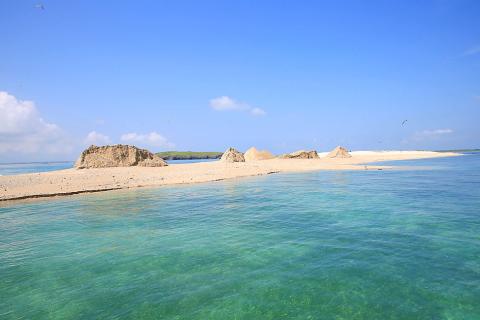Environmental protection groups protested against a dredging operation at Niaoyu Port (鳥嶼港) in Penghu County, saying the sand pulled from the harbor and piled on a clearing might be blown out to sea and damage coral reefs.
At least 35,000m3 of sand has been dredged up and deposited on the eastern part of Penghu Beach, in Niaoyu Park.
The sand deposit could harm local ecology, as terns nest on the beach in the summer, the groups said, adding that northeasterly monsoon winds in the winter could blow the sand back into the sea, which could cause an ecological disaster if the sand settles on coral reefs.

Photo provided by a reader
The area in question is a sandbank and not an intertidal zone, Penghu County Public Works Department Director Tsai Chi-hsien (蔡淇賢) said, adding that the department, along with the Department of Agriculture and Fisheries and the National Property Administration, decided that depositing the sand in the area would have minimal effects on local ecology.
Tsai said the sand deposit at Niaoyu Port might be caused by changes in local hydrology.
However, sources said that the local hydrology was not only changing at Niaoyu Port, adding that Jibei Islet (吉貝嶼) was also seeing a buildup of sand on its beaches after building breakwaters.
Artificial structures might be the primary cause of the hydrological changes, the sources said, adding that natural occurrences, such as typhoons, might also play a part.
The county government’s primary focus would be working toward the conservation of extant intertidal zones and ensuring the protection of marine ecology in the area, the sources said.

Actor Darren Wang (王大陸) was questioned by prosecutors for allegedly orchestrating an attack on a taxi driver after he was allegedly driven on a longer than necessary route in a car he disliked. The questioning at the New Taipei City District Prosecutors’ Office was ongoing as of press time last night. Police have recommended charges of attempted murder. The legally embattled actor — known for his role in the coming-of-age film Our Times (我的少女時代) — is under a separate investigation for allegedly using fake medical documents to evade mandatory military service. According to local media reports, police said Wang earlier last year ordered a

A man in Tainan has been cleared on charges of public insult after giving the middle finger during a road rage incident, as judges deemed the gesture was made “briefly to express negative feelings.” In last week’s ruling at the High Court’s Tainan branch, judges acquitted a driver, surnamed Cheng (程), for an incident along Tainan’s Nanmen Road in September 2023, when Cheng had spotted a place to park his car in an adjacent lane. Cheng slowed down his vehicle to go into reverse, to back into the parking spot, but the car behind followed too closely, as its driver thought Cheng

CAUTION: Based on intelligence from the nation’s security agencies, MOFA has cautioned Taiwanese travelers about heightened safety risks in China-friendly countries The Ministry of Foreign Affairs (MOFA) yesterday urged Taiwanese to be aware of their safety when traveling abroad, especially in countries that are friendly to China. China in June last year issued 22 guidelines that allow its courts to try in absentia and sentence to death so-called “diehard” Taiwanese independence activists, even though Chinese courts have no jurisdiction in Taiwan. Late last month, a senior Chinese official gave closed-door instructions to state security units to implement the guidelines in countries friendly to China, a government memo and a senior Taiwan security official said, based on information gathered by Taiwan’s intelligence agency. The

President William Lai (賴清德) should protect Taiwan Semiconductor Manufacturing Co (TSMC), and stop supporting domestic strife and discord, former president Ma Ying-jeou (馬英九) wrote on Facebook yesterday. US President Donald Trump and TSMC on Monday jointly announced that the company would invest an additional US$100 billion over the next few years to expand its semiconductor manufacturing operations in the US. The TSMC plans have promoted concern in Taiwan that it would effectively lead to the chipmaking giant becoming Americanized. The Lai administration lacks tangible policies to address concerns that Taiwan might follow in Ukraine’s footsteps, Ma wrote. Instead, it seems to think it could